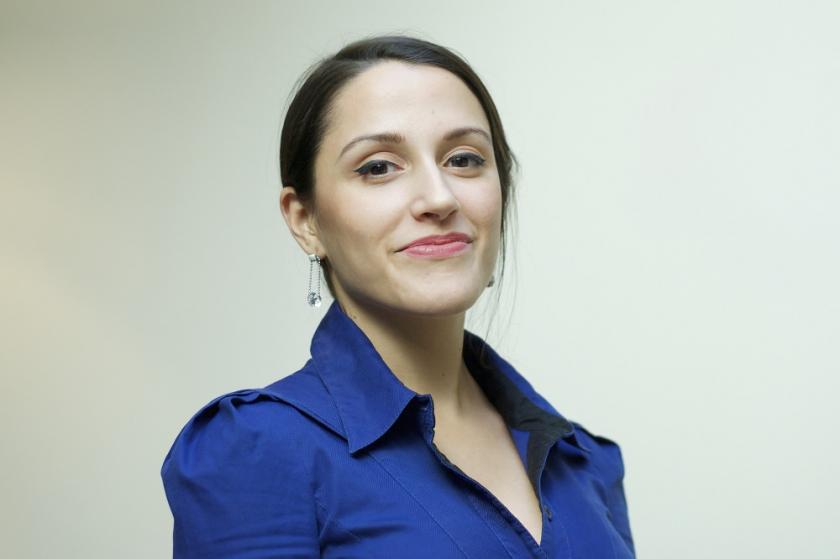The Hospital Club's h.Club 100 Awards are so-called because they consist of 10 awards in 10 categories, each of which has 10 nominees. Nine of the awards are confined to a specifc area of the creative industries (stage, theatre, music etc). The exception is the Rising Stars category, open to anyone under the age of 25. Last year's winner was Nina-Sophia Miralles, founding editor of the online magazine Londnr.
Londnr.com is a destination of choice for readers in search of lively, unexpected cultural insights that are hard to find in any other single location. From food to architecture via visual and other arts, it also has a series of regular features with teasing titles like Brief History, Public Warning and The Science of…. However widely it ranges, the clever, innovative publication is first and foremost an ongoing love letter to London and all who sail in her.
Nina-Sophia Miralles will be appearing in at The Hospital Club on 15 June to talk about the rise of the Londnr. In the mean time, she talks to theartsdesk.
 THE ARTS DESK: How did Londnr.com come about?
THE ARTS DESK: How did Londnr.com come about?
NINA-SOPHIA MIRALLES: I used to want to do fiction-writing but that's pretty isolating and I was quite young. You spend a lot of time at home on your own. So I decided to go into journalism and do some freelancing and wasn’t really enjoying it very much. You’re constantly writing what other people want, and altering your tone of voice. I wanted to write about what I was interested in as myself. Londnr came from that. I was previously editor of a different online magazine. I had a bit of experience with working with other people’s copy, getting pictures in. I wanted a platform for myself and other people like me who wanted to write but needed a space to still be themselves.
Who are your readers?
The demographic is people who think in a certain way and have an interest in the arts. It’s 50-50 men and women, between 25 to 45. The majority of our readers are in London. We say it’s for thoughtful people with a curious mind. Everything we write is telling the reader something new.
Your About page says you “promise never to do celebrity gossip, and breaking news isn’t our thing”. How did you arrive at that editorial stance?
There’s no point doing news because we can’t pretend to keep up. If someone pitched to me an article about sport or technology I wouldn’t know where to start. As for celebrity I just don’t think it’s of interest. I consider us more sophisticated than that.
Who writes for Londnr?
Generally I would say they are people who want to go on to write novels or non-fiction - people with a genuine literary bent. There are about six in the core stable. We tend to work with writers long-term. It’s rare that someone will do only one article. I like to meet everyone who works for us so we can establish an understanding. People aren’t just dashing off a few hundred words and sending in an invoice.
How frequently do you post new content?
We only publish two articles a week. I don’t really adhere to the general rules of the internet. I don’t like how oversaturated things are. I don’t like constant updates. And it’s unrealistic to expect it of the audience. Readers like the fact that there’s no pressure with our content and they can keep up with all of it. I sort of want to foster the idea that our content is more considered, high-quality journalism.
How have you come at the expectation that the internet is free?
When I first started the Londonr I was very young and a bit naïve. It’s pretty nightmarish. You really have to have a lot of imagination. You’ve got to try and pull money from completely different ventures to make up for the costs. We charge for events. That can be lucrative but it’s also hit and miss. Events is something which everybody has cottoned on to nowadays. London is so limitless, how are you going to stand out?
Are you optimistic that the internet is going to work out how to get people to pay for stuff?
I think tentatively I would say yes. It’s already heading that way. But I think at the moment what I’m most optimistic about is print. I think that print is making a definite comeback. I planned never to do a print editon but then I started doing research and realised it would be beneficial. I’m quite nostalgic in my tastes. It’s something more tangible for myself and my writers and it’s a way of targeting a whole new audience. I’m confident we can make it work. We publish our first edition in September.
What did it mean to win the Rising Stars category of the h.Club 100 Awards?
It was nuts. I was sick and giddy with excitement. I didn’t really know how to react because nothing that thrilling has ever happened to me before.
- Nina-Sophia Miralles will be interviewed by Alexandra Coghlan of The Arts Desk at The Hospital Club in Covent Garden on 15 June.
- Londnr Magazine website



Add comment